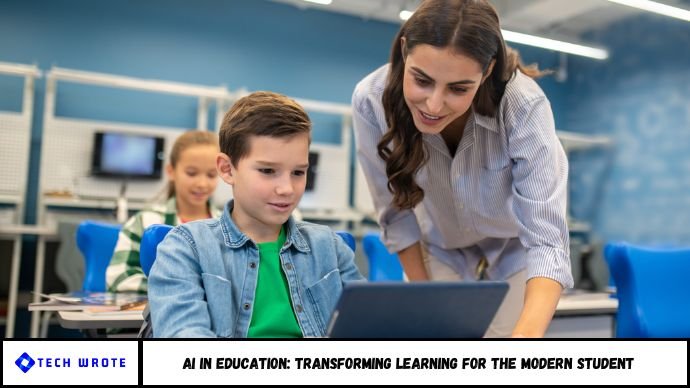Artificial Intelligence (AI) is revolutionizing education by offering personalized learning experiences, improving student engagement, and streamlining administrative tasks. This article delves into the transformative role of AI in education, highlighting its benefits, challenges, and future implications for students, educators, and institutions.
Introduction: The Evolution of Learning in the Age of AI
In 2024, the global AI in education market was valued at approximately $8.94 billion and is projected to reach $88.2 billion by 2032, growing at a compound annual growth rate (CAGR) of 43.3% . This rapid growth underscores the significant impact AI is having on the educational landscape. But how exactly is AI transforming the way we learn?
From personalized learning paths to automated administrative tasks, AI is reshaping education. This article explores how AI is enhancing learning experiences, the benefits it brings, the challenges it presents, and what the future holds for AI in education.
1. Personalized Learning: Tailoring Education to Individual Needs
Adaptive Learning Systems
AI-powered adaptive learning platforms analyze student performance in real-time, adjusting content and assessments to match individual learning paces and styles. This personalized approach has led to:
- 30% improvement in student performance
- 42% increase in student engagement
AI Tutors and Assistants
AI tutors provide 24/7 support, offering explanations, answering questions, and guiding students through complex topics. These tools have been shown to:
- Increase student success rates by up to 33%
- Enhance language proficiency by 33%
2. Enhancing Student Engagement and Retention
Gamification and Interactive Learning
AI integrates gamification techniques into learning platforms, making education more engaging and motivating students to participate actively. This approach has resulted in:
- 25% reduction in dropout rates
- 60% increase in course completion rates
Real-Time Feedback
AI systems provide instant feedback on assignments and assessments, allowing students to understand their mistakes and learn from them promptly. This immediate response helps:
- Improve learning outcomes
- Increase retention rates
3. Streamlining Administrative Tasks
Automated Grading and Assessment
AI-powered grading systems can evaluate assignments and exams quickly and accurately, reducing the time educators spend on administrative tasks. This efficiency allows teachers to:
- Save up to 70% of time spent on grading
- Focus more on interactive teaching
Chatbots for Student Support
AI chatbots handle routine inquiries, such as answering questions about schedules, assignments, and campus facilities. These bots can:
- Answer up to 80% of standard student inquiries
- Reduce administrative costs by 25%
4. Addressing Educational Inequities
Support for Diverse Learners
AI tools assist students with disabilities by providing personalized learning experiences. For example:
- AI-based reading tools improved literacy in early learners by 35%
- AI-powered visual aids improved learning outcomes for visually impaired students by 30%
Bridging Language Barriers
AI-driven language translation apps support over 75 languages for educational content, making learning accessible to a broader audience .
5. Preparing for the Future: AI Fluency in Education
Recognizing the importance of AI literacy, institutions are integrating AI training into their curricula. For instance, Ohio State University has mandated that all students gain fluency in AI as part of their education, starting with the incoming freshman class .
This initiative aims to prepare students for a workforce increasingly influenced by AI technologies, ensuring they are equipped with the skills needed to thrive in an AI-driven world.
FAQs
1. How does AI personalize learning experiences?
AI analyzes student data to adapt content and assessments to individual learning styles and paces, enhancing engagement and retention.
2. What are the benefits of AI in education?
AI improves student performance, increases engagement, streamlines administrative tasks, and supports diverse learners.
3. Are AI tutors effective?
Yes, AI tutors provide 24/7 support, offering explanations and guidance, leading to improved student success rates.
4. How does AI assist students with disabilities?
AI tools offer personalized learning experiences, such as reading aids and visual support, to accommodate diverse learning needs.
5. What is AI fluency, and why is it important?
AI fluency refers to understanding and effectively using AI technologies. It is crucial for preparing students for future careers in an AI-driven world.
6. What challenges does AI face in education?
Challenges include data privacy concerns, the need for teacher training, and ensuring equitable access to AI technologies.
Conclusion
AI is no longer a futuristic concept but a present-day reality reshaping education. By personalizing learning, enhancing engagement, streamlining administrative tasks, and supporting diverse learners, AI is making education more accessible and effective.
As institutions continue to integrate AI into their curricula, students are better prepared for a future where AI plays a central role. Embracing AI in education is not just about adopting new technologies but about fostering a learning environment that is inclusive, efficient, and forward-thinking.


